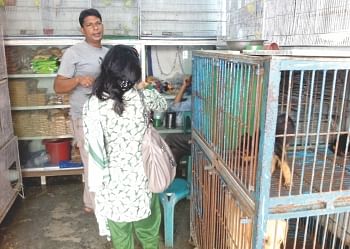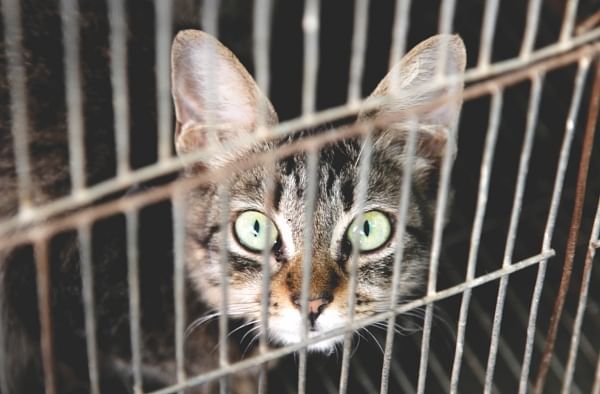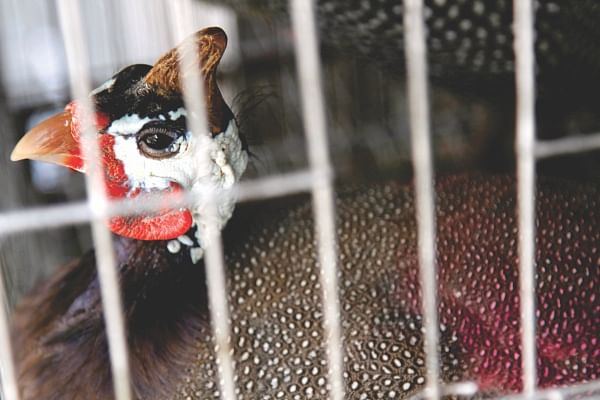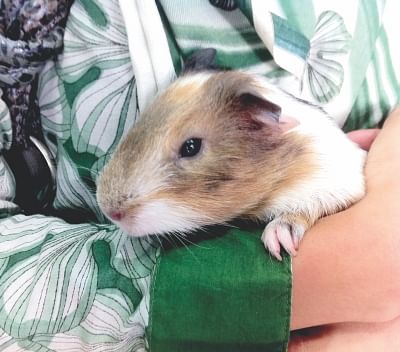| Home - Back Issues - The Team - Contact Us |
 |
| Volume 10 |Issue 41 | October 28, 2011 | |
|
|
Animal Rights Mission Orangutan ANIKA HOSSAIN Despite the fact that certain well known environmentalists have their doubts about this particular statistic, the official report states that nine percent of our country consists of forests, which are thought to be homes to a large variety of wild animals. Unfortunately, while human population in this country has tripled over the past 40 years or so, our supposedly diverse wild life population hasn't been that lucky.
More than 13 species of wild animals have become extinct over this period of time, according to the International Union for Conservation of Nature (IUCN). Research by IUCN also shows that over 100 species are now considered endangered or critically endangered. Deforestation and destruction of their natural habitat is, of course, the primary culprit for this tragedy, but there are other, perhaps more dangerous, predators out there, that even our Royal Bengal tigers (on the endangered list) need to worry about. Poaching and smuggling of rare wild creatures has increased rapidly over the years and is now an extremely lucrative business. The laws protecting animals are, like many other laws in this country, quite archaic. We follow the Wild Life Act created way back in 1974 (although the bill for an update is now in place, waiting to be approved). While the current act prohibits all businesses related to wild animals, it is much too lenient. The proposed act suggests a life sentence and fine upto Tk 300,000, for all poachers and smugglers. But our wild life criminals still find sophisticated ways around these new laws and manage to have a thriving business. To catch some of them in the act, we at The Star, decided we would go wild animal shopping. Posing as potential buyers, we went to Katabon (that big line of pet stores you see when you go by the Dhaka University Market), one of the largest pet markets in the city. Of course at first glance we saw nothing. The innocent looking but filthy pet stores (although violating all animal rights in terms of keeping them in humane conditions) looked like they were abiding by the laws. We saw tiny birdcages, each stuffed with atleast 50 different kinds of pigeons and parrots squashed against each other. Others housed gigantic dogs that barely had room to stand in their tiny space. In one cage, which looked fairly empty were three big rats, one dead and the other two happily feasting on the rotting corpse. It looked like just another regular store in Katabon. We chose to try our luck at a store called “The Fly Birds,” where they were bathing a little puppy, which looked absolutely petrified by the ice-cold water being poured on its tiny body. We walked around the store, admiring the animals and talking to each other about how we would love to adopt “unusual pets.”
Naturally, the shopkeeper followed us around eaves dropping, listening to our elaborate description of a new house we had bought with a large garden, just perfect for pets. After he had his fill of the conversation, he rudely interrupted and asked what kind of “unusual pet” we were interested in. We pretended to think about it a while and decided we wanted a monkey. A baby Orangutan not more than a month old, to be specific. The shopkeeper, Saif Uddin Ahmed (Saiful), thought for a second and said, “I can arrange that.” We replied that there were no monkeys in his store and asked how on earth he would get hold of an Oragutan. Saiful claimed he would get one from Chittagong, where he had “People who can manage these things.” He warned us, that it would be expensive and may take three to four days to accomplish. If he had to import one, he would have to charge over a lakh.
When we continued to show interest in buying the creature, he placed a call to his “colleague” in Chittagong, someone by the name of Shakil, who he claimed does not have a last name. Shakil let him know that he had a baby Orangutan in his possession and would be able to deliver by the next day. They would charge us Tk 80,000 (Tk 50,000 advance and the rest upon delivery). We bargained irritably for a few minutes, pretending to be outraged by the price, but after a few more calls and much bickering, Shakil and Saiful refused to budge. “These animals are tough to get a hold of,” said Saiful, “You must understand, it is against the law to capture and sell them, which is why we have to charge such high prices,” he added conspiratorially. We decided to think about it and consult our father (we posed as siblings) before we gave him the advance. Agreeing to come back later that day with the money (provided that we agreed to get the creature), we departed on good terms with his business card, phone number, and a promise from him to provide other exotic animals should we decide against buying a monkey. Later that afternoon, one of our team members posed as our father and placed a phone call to Saiful, to finalise the deal. We haggled some more and we claimed we didn't believe he actually had an Orangutan and demanded he describe the animal in detail. Saiful provided a description, but it turned out that the monkey he had in his possession was in fact a Western Hoolock Gibbon (black with a white forehead), better known as hoolook in our country, and also very rare (capturing it is strictly prohibited). When we refused to purchase this, Saiful offered to sell us a pair of owls, also extremely rare and of course illegal, for Tk 8000. Upon haggling some more however, we brought the price down to Tk 3000 for the pair, and one week till delivery time (his contact person needed to catch the owls first). He claimed he could not keep these at his store for long, incase he got caught by the authorities, “But keeping them hidden inside your house is safe,” Saiful claimed. “Wild animal trade is a huge ecological concern,” says Pavel Partha, an ecology and biodiversity researcher. “By keeping them in captivity the food chain and ecological balance is being destroyed. The Wild Life Act of '74 is now being replaced by the Bangladesh Wild Life Act 2010, which clearly states that it is a crime to capture or kill certain birds, mammals, reptiles, snakes etc and we need to strictly implement these,” he says. Illegal or not, it seems that while environmentalists and ecologists are holding conferences and seminars about the importance of biodiversity and animal preservation, and submitting bills to protect our wild life, smugglers and poachers remain unaware of the damage they are causing and continue to make, perhaps millions by engaging in animal trade, right under the noses of the authorities. Perhaps it's time to re-strategise?
Copyright (R) thedailystar.net 2011 |



